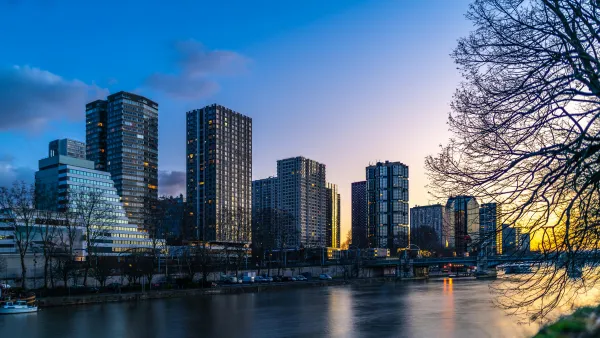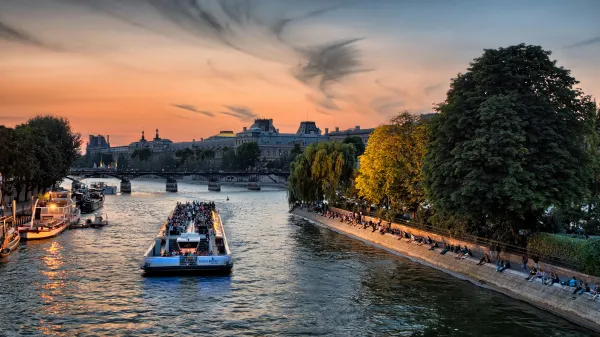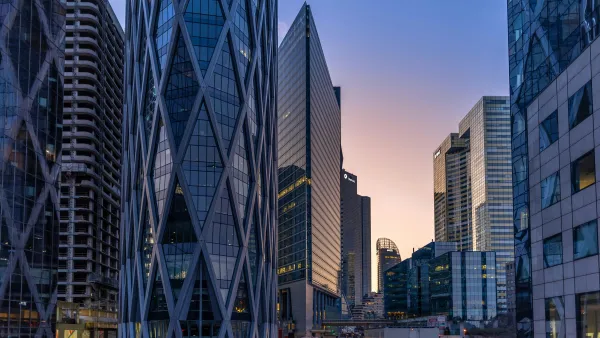
France Real Estate Investment Guide 2025: Strategic Opportunities in Europe's Premier Market
Bottom Line Up Front: France's real estate market is bouncing back strong in 2025. Property prices dropped about 5% since 2022, but rental income has jumped to 5.2% on average nationwide. Mortgage rates sit at just 3.1%, and home sales are up 4.3% year-over-year. This makes France a smart pick for international buyers wanting European property exposure.
France stands as Europe's most steady property market in 2025. It gives investors a rare mix of cultural prestige, market stability, and real value chances. While neighboring European markets face ups and downs, France's home sector shows strong staying power backed by solid basics and growing investment paths.
The French property scene has changed a lot since 2022. This creates great entry points for sharp international buyers. Many European markets face uncertainty, but France combines lower property prices, better yields, and stable rules. This makes it Europe's top spot for smart real estate moves.
Market Recovery Gains Steam
France's home market is seeing its best recovery since the post-pandemic boom ended in 2022. Home sales hit 893,000 in the 12 months through May 2025. This shows a 4.3% jump from last year and marks three straight months of growth according to official INSEE data.
This comeback shows more than just better numbers - it signals basic market health returning after a needed adjustment period. The housing price index showed positive growth of 1.0% in Q1 2025. Both used homes (+1.0%) and new properties (+1.1%) helped drive this rise.
Key Performance Numbers:
National property prices: +0.6% year-over-year (Q1 2025)
Home sales growth: +4.3% (May 2025)
Mortgage rates: Steady at 3.1% (down from 4.2% in late 2023)
Rental income boost: 5.2% national average (up from 4.6% in 2022)
The market's recovery gets extra strength from better financing terms. Mortgage rates have dropped a lot from their peak. The Bank of France reports average rates of 3.10% for new home loans in June 2025. This beats the eurozone average by a wide margin.

Investment Appeal Across Market Types
France's property market shows great range. It fits many investment styles from luxury buys to value-focused chances. This flexibility makes the country unique among European spots, where investors often face either premium or distressed assets only.
Premium Market Position
Paris keeps its global luxury status despite recent price drops. Properties in top areas still draw international money. The average price per square meter sits at €9,321 after a measured drop from previous highs. This adjustment makes values better while keeping the city's basic appeal.
The luxury segment goes beyond Paris to include established spots like Nice. Properties over €2 million have stayed strong with sales rising 19.47% since 2019. The French Riviera's lasting appeal to wealthy individuals creates steady demand for premium assets.
Value-Focused Chances
Mid-sized cities show strong opportunities for income-focused investors. Toulouse gives gross rental yields of 5-6%, backed by its aerospace industry and big student population. Avignon leads French cities with impressive 6.8% gross yields. Meanwhile, Marseille and Lyon offer 3.6-5% returns with stable tenant demand.
Regional Yield Comparison:
Avignon: 6.8% gross rental yield (highest among major cities)
Toulouse: 5-6% (aerospace industry and university support)
Lyon: 3-5% (business travel and corporate demand)
Marseille: 3.6-5% (France's second-biggest city)
Nice: 2.5-3.5% (tourism and lifestyle premium)
Paris: 2-3% (unmatched liquidity and growth potential)
The yield picture reflects France's economic diversity and rental market basics. Unlike markets that depend on single sectors, French cities benefit from mixed economies. This gives tenant stability across business cycles.
Lifestyle Benefits Define French Living
France's investment appeal goes beyond money numbers. It includes lifestyle benefits that boost both personal enjoyment and long-term asset values. This mix of quality of life and investment merit sets France apart from markets offering purely financial returns.
The country's diverse geography supports varied lifestyle choices. Mediterranean regions give year-round sunshine and coastal living. Mountain areas offer alpine fun and seasonal rental potential. Historic cities deliver cultural immersion and urban sophistication.
Healthcare excellence adds real value to French living. The nation's healthcare system ranks among the world's best. It provides full coverage and premium medical services that improve living quality while cutting healthcare costs compared to many international alternatives.
Educational opportunities strengthen family investment choices. France's famous university system and international schools create steady rental demand. They also offer educational benefits for investor families. Cities like Lyon, Toulouse, and Montpellier especially benefit from large student populations that provide consistent tenant bases.

Cultural richness fills daily life throughout France. From Parisian museums and theaters to Provence's artisan markets and Bordeaux's wine culture, the country offers unmatched cultural engagement. This enhances both immediate living experience and long-term property appeal.
Transportation infrastructure helps both domestic and international mobility. High-speed rail connections link major cities efficiently. International airports provide global connectivity. This accessibility supports both personal use and rental property appeal, especially for business travelers and international visitors.
Prime Investment Locations
France's geographic diversity creates distinct investment regions. Each offers unique advantages and market dynamics. Understanding these regional traits proves essential for optimizing investment strategies and returns.
Paris and Île-de-France Region
Paris remains France's premier investment spot. It combines global appeal with market liquidity unmatched elsewhere in the country. The capital recorded modest price increases in early 2025. The average cost per square meter reached €9,321 after recent adjustments.
The Grand Paris Express transportation project transforms suburban investment prospects. New metro lines extending to municipalities like Villejuif, Gennevilliers, and Aubervilliers create development opportunities with rental returns of 4-7% across the greater Paris region.
This guide provides the local insights necessary for successful Parisian property investment.
Lyon: Business Hub Excellence
Lyon shows France's balanced urban appeal. It combines economic strength with cultural sophistication. The city's position as France's second financial center creates consistent business travel demand. This supports steady rental markets across various property types.
The city's culinary reputation and UNESCO World Heritage status enhance its tourism appeal. This creates short-term rental opportunities alongside traditional residential letting. Lyon's diverse economy spans finance, pharmaceuticals, and technology sectors. It provides employment stability that translates to robust tenant demand.
Bordeaux: Wine Country Sophistication
Bordeaux presents compelling opportunities combining cultural appeal with improving economics. The city's UNESCO-listed historic center and global wine reputation create sustainable tourism demand. Its emerging technology sector diversifies the economic base.
Recent infrastructure investments enhance Bordeaux's accessibility and appeal. These include high-speed rail connections and urban renewal projects. Property investors benefit from both lifestyle attractions and practical advantages like competitive pricing relative to Paris and other major European cities.
Nice and the Côte d'Azur
Nice maintains its position as France's premier Mediterranean destination. It attracts both lifestyle purchasers and yield-focused investors. The city's 300+ days of annual sunshine combine with sophisticated cultural offerings and international connectivity. This creates diverse investment opportunities.
The luxury market shows particular strength. High-end properties demonstrate resilience despite broader market adjustments. International buyers continue viewing Nice as an attractive alternative to more expensive Mediterranean destinations. This supports both capital values and rental demand.
Ownership Paths for International Buyers
France welcomes international property ownership with minimal restrictions. It provides clear pathways for foreign investment across all property types and regions. This openness, combined with established legal frameworks, creates secure investment environments for global buyers.
Direct Purchase Structure
International buyers enjoy the same ownership rights as French citizens. There are no restrictions on property type, location, or quantity. The purchase process requires working with a notaire (notary). They ensure legal compliance and handle all regulatory requirements.
Transaction Cost Structure:
Notary fees: 7-8% of purchase price for older properties
Registration taxes: 5.08-5.09% of property value
Legal and administrative costs: 1-2% additional
Total acquisition costs: Typically 8-10% of purchase price
These costs are substantial but provide full legal protection. They ensure clear title transfer. The notaire system offers international buyers confidence in property transactions. These legal professionals carry professional insurance and government oversight.
Financing Opportunities
French banks actively serve international buyers. Mortgage availability for non-residents comes at competitive rates. Current lending rates of 3.1% for new housing loans represent attractive financing costs. This especially compares well to many international markets.
Typical Mortgage Parameters:
Loan-to-value ratios: Up to 80% for non-residents
Interest rates: 3.1-3.5% fixed rate options
Loan terms: Up to 25-30 years depending on borrower profile
Income requirements: Generally 3x annual income for loan amount
International buyers benefit from France's established banking relationships. Mortgage broker networks specialize in non-resident financing. This infrastructure simplifies the borrowing process while ensuring competitive terms.

Legal Structure Optimization
Investors often use French legal structures to optimize ownership and taxation. The Société Civile Immobilière (SCI) provides flexible ownership arrangements. This is especially beneficial for family investments or multiple property holdings.
SCI benefits include simplified succession planning and potential tax advantages. It also offers flexible ownership percentages among multiple parties. International buyers frequently employ SCIs for larger investments or when establishing ongoing French property portfolios.
Residency Benefits and Investment Pathways
France doesn't offer a traditional golden visa program. But it provides smart pathways for investors seeking European residency through business engagement. These programs require active economic participation rather than passive investment. This aligns with France's emphasis on genuine contribution to the national economy.
Talent Passport Investment Routes
The Talent Passport program offers investors multiple pathways to French residency through economic engagement. Business investors must commit at least €300,000 to French companies. Startup creators need minimum investments of €30,000 for innovative projects.
Investment Categories:
Business Investment: €300,000 minimum with 10% ownership requirement
Startup Creation: €30,000 minimum for innovative business projects
Innovative Economic Projects: Variable investment based on project scope
These programs provide renewable four-year residence permits with pathways to permanent residency after five years. Unlike passive investment schemes, France's approach requires genuine business involvement and job creation. This creates sustainable economic contributions.
Talent Passport Benefits:
Four-year renewable residence permits
Family inclusion (spouse and children under 18)
Path to permanent residency after five years
EU mobility rights and work authorization
Access to French healthcare and education systems
The program's business focus sets it apart from traditional golden visa schemes. It requires investors to actively participate in French economic development rather than simply parking capital in real estate or government bonds.
Alternative Residency Options
The Financially Independent Person (Visiteur) visa provides residence opportunities for individuals with sufficient passive income. This typically requires €1,500-2,000 monthly income demonstration. While not specifically investment-focused, this option suits retirees or individuals with investment income seeking French residency.
Students and professionals can access various visa categories that may eventually lead to permanent residence. This creates additional pathways for individuals planning long-term French connections beyond pure investment motivation.
Market Outlook and Strategic Timing
France's property market enters 2025 with improving basics and attractive investment conditions. These may not last forever. Several factors come together to create current opportunities that investors should consider carefully.
Economic Tailwinds
Interest rate stabilization provides crucial support for property demand. Mortgage rates declining from 4.2% to 3.1% significantly improve buyer affordability. They also reduce carrying costs for investors using leverage.
Construction activity remains well below long-term averages. This creates supply constraints that should support future price appreciation. Housing permits and new project starts continue running significantly below demographic requirements. This suggests structural undersupply persisting through 2025 and beyond.
Supply-Demand Dynamics:
New construction permits: 23.7% decline in 2023
Demographic housing demand: Exceeds current supply by estimated 100,000+ units annually
Existing home inventory: Normalized after pandemic-era shortages
Rental demand growth: Supported by employment recovery and household formation
Energy efficiency regulations create both challenges and opportunities. Properties with poor energy ratings face rental restrictions. Well-rated buildings command premium valuations. This regulatory environment rewards quality assets while creating upgrade opportunities in underperforming properties.
Regional Growth Patterns
Provincial cities show particular strength as remote work trends and lifestyle preferences drive migration from expensive urban centers. Cities like Toulouse, Bordeaux, and Lyon benefit from this redistribution. They offer superior value propositions compared to Paris.
The Grand Paris Express infrastructure project continues reshaping suburban investment opportunities around the capital. New transportation links create development prospects in previously less accessible areas. This provides early investors with potential appreciation opportunities as infrastructure completion approaches.
Tourism recovery supports markets in traditional leisure destinations. Nice, Cannes, and other Côte d'Azur locations benefit from returning international visitors. Mountain regions experience growing interest in outdoor recreation and lifestyle property investments.
Strategic Entry Considerations
Current market conditions may represent an optimal entry window for international investors. Property price adjustments of about 5% since 2022 have improved value propositions without undermining basic market health.
Financing availability at current rates provides leverage opportunities that may diminish as monetary policy evolves. Investors considering French property exposure should evaluate whether current conditions align with their strategic timing preferences.
Market recovery momentum suggests that attractive entry opportunities may narrow as 2025 progresses and buyer confidence fully returns. Properties in prime locations and high-demand rental areas may experience renewed price competition as investment activity increases.
The regulatory environment remains stable. There are no immediate threats to foreign ownership rights or investment incentives. This stability contrasts favorably with some European markets experiencing policy uncertainty regarding international property investment.
Looking for the right approach to buying property abroad?
Frequently Asked Questions
What are the main requirements for foreigners buying property in France?
Foreigners face no restrictions when purchasing French real estate and enjoy identical ownership rights to French citizens. The process requires working with a notaire who handles all legal aspects. You'll need proof of identity, financing arrangements, and about 10% of the purchase price in available funds for deposits and closing costs. The entire transaction can be completed remotely through power of attorney.
How do French mortgage rates compare internationally, and what financing is available to non-residents?
French mortgage rates currently average 3.1% for new housing loans, making them very competitive internationally. Non-resident buyers can access up to 80% financing with 25-30 year terms. Banks require income verification and apply a 3:1 income-to-loan ratio. France offers one of Europe's most accessible markets for international mortgage financing.
Which French cities offer the best rental yields for property investors?
Avignon leads with 6.8% gross rental yields, followed by Toulouse at 5-6%. Mid-tier cities like Lyon and Marseille offer 3.6-5% yields with stable tenant demand. Paris yields are lower at 2-3% but offers unmatched liquidity and long-term growth potential. University cities consistently outperform tourist-dependent markets for reliable rental income.
How does France's Talent Passport program work for property investors seeking residency?
France's Talent Passport requires active business investment, not passive real estate purchases. The Business Investment track needs €300,000 minimum with 10% company ownership. The Startup Creation route requires €30,000 for innovative projects. Both provide renewable four-year residence permits for families, with permanent residency paths after five years.
What additional costs should international buyers budget beyond the property purchase price?
Plan for about 8-10% of the purchase price in additional costs. This includes notary fees of 7-8%, registration taxes of 5.08-5.09%, and legal fees of 1-2%. Add property surveys, ongoing taxes, insurance, and potential renovations for rental properties into your total investment budget.
How do energy efficiency ratings affect property values and rental potential in France?
Energy efficiency is now crucial in French real estate. A and B-rated properties get up to 7% price premiums. Properties with G ratings face rental restrictions from January 2025, with F-rated properties restricted by 2028. Well-rated buildings benefit from higher demand, premium pricing, and long-term marketability.
What makes France attractive compared to other European property markets in 2025?
France offers market stability while neighbors face uncertainty. Spain ended its golden visa program, Greece raised thresholds to €800,000, and Portugal shifted away from real estate programs. France maintains consistent foreign ownership policies, competitive mortgage rates, and diverse opportunities from €300,000 to €2 million+. This combination makes it Europe's most balanced investment destination.
How should investors evaluate the current market timing for French real estate investment?
Current conditions suggest an attractive entry window. Property prices are down 5% since 2022 while rental yields improved to 5.2%. Mortgage rates at 3.1% provide favorable financing. Transaction volumes recovering at 4.3% show market health without excessive competition. These favorable conditions may narrow as recovery accelerates through 2025.